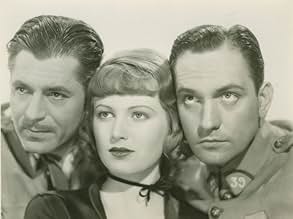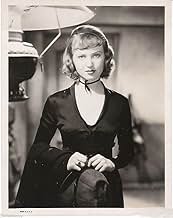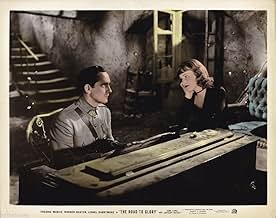Adicionar um enredo no seu idiomaThe story of trench life during World War I through the lives of a French regiment. As men are killed and replaced jaunty Lt. Denet becomes more and more somber. His rival for the affection ... Ler tudoThe story of trench life during World War I through the lives of a French regiment. As men are killed and replaced jaunty Lt. Denet becomes more and more somber. His rival for the affection of nurse Monique is Capt. La Roche.The story of trench life during World War I through the lives of a French regiment. As men are killed and replaced jaunty Lt. Denet becomes more and more somber. His rival for the affection of nurse Monique is Capt. La Roche.
- Direção
- Roteiristas
- Artistas
- Prêmios
- 3 vitórias no total
- French Soldier
- (cenas de arquivo)
- (não creditado)
- French Soldier
- (cenas de arquivo)
- (não creditado)
Avaliações em destaque
This is a good film if a little depressing at times. I enjoyed the first half of the film more than the second half. There are good scenes, eg, the whole section when the troops are sent on duty for the first time - the man on the wire, the Germans digging underneath the trenches to plant explosives, the relief when their replacements arrive, and the moment when a relief soldier asks what it's like and is given the reply "you'll find out" - a few moments later when the troops are clear of danger, we have a very poignant moment. The film then involves itself in the love interest before returning to the action.
The acting from Warner Baxter and Fredric March is better than June Lang and Lionel Barrymore. In fact, Barrymore is quite annoying. No way would he have been allowed to join the soldiers let alone volunteer on a vital mission. I couldn't really feel any sympathy for him. Just like I cant feel any sympathy for do-gooder numbskulls who visit war-zones in the name of charity/aid, get captured and then get be-headed.
There is a dramatic twist at the end regarding the love triangle between Baxter, March and Lang, and, despite heroics, the overall effect of the film is downbeat.
Warner Baxter plays La Roche, the captain of a storied French regiment alternating back and forth from the front lines of trench warfare year in and year out. His reputation as a hard and good military leader is well-entrenched in the mind of the new lieutenant, Frederic March's Michel Donet. It scares him a bit that La Roche's unit often comes back with only half of its men after action, but the regiment's legacy must be maintained. Introduced very early in the film is the love triangle between La Roche, Donet, and La Roche's girl Monique (June Lang), a nurse at the nearby field hospital. This whole love triangle really doesn't come to a whole lot in the end, but Donet encounters Monique during an air raid, having no idea her connection to La Roche, and he falls for her pretty quickly. She's resistant to his veteran charms being a veteran of the war for as long as he is, and it doesn't hurt that she's one of the only pretty girls around. She seems somewhat drawn to him, but her loyalty to La Roche is too strong.
The regiment goes to the front for their several weeks service, greeted by the sound of a French soldier dying on the wire just on the French side of No Man's Land. Donet has a solution, and it's to send two other men to rescue the man on the wire. That fails quickly, and Donet manages to rescue one of them, shot in the leg and seeing the end of his involvement in the war. La Roche comes up with another solution, pulls out his pistol, and fires a few times until the man on the wire has been put out of his misery.
This portrait of the miserable existence on the front line of The Great War is really where this movie shines and works at its absolute best. This is a clear-eyed look at a tense existence where any moment could bring a falling shell or errant bullet to end them instantly. The tension gets centered specifically on the sound of a mine being dug underneath the barracks. What can they do about it? Well, it seems like nothing but wait and hope that they rotate out before it explodes. Every moment is defined by listening for the sound of the pick axe below ground, and if it pauses everyone tenses up, terrified that the job is done and that they are all about to die. They do manage to get out on their rotation without it exploding, but it goes off within sight of them marching away, killing the men who replaced them.
I'm not sure how realistic that might be, that nothing would be done about a tunnel being dug underneath a position, but as a manifestation of the impending danger that could kill them all without notice, it's fantastic. This makes the terror of living at the front lines, in the trenches, absolutely palpable and tangible.
Then the audience introduces its second major subplot. In La Roche's first speech to his men before they went out he saw an older man who wanted to contribute by fighting in the war, but La Roche sent him back as unfit. While speaking to his men before going out again, he sees another old man and has him sent to him. It turns out that this is his father. La Roche is happy to see him, proud of him even, but he has to send his father back. This is no place for an old man. Treated well by Donet because of his connection to La Roche, Papa La Roche waits in the captain's house by the fire with a guard. The scene where Papa La Roche and the guard talk about how the paper order is the only thing getting him to leave is an odd bit of comedic business in a rather deathly serious movie as Papa La Roche and the guard allow the wind to blow the order to the fire and then finish it off by blowing it into the fire themselves. I get the point from a plot standpoint (gotta keep Papa La Roche around for the final act of the movie) and as an effort to break up the dour atmosphere of the film as a whole, but I think it ends up taking up too much time and is too obviously comic to fit in properly. It's better to break up the dour action with small bits of comedic business that arise from normal character interactions than to have a showstopper scene like this. Oh well, it's over soon, and the regiment is back to the front.
Before they go, though, Donet finds Monique and woos her. He's a nice guy, and she's a nice girl. They have a natural affinity, and the only thing holding her back is her attachment to La Roche, but the affection is genuine, especially after the nice moment where Donet invites himself to sit with her at dinner. He's a piano player with a cheery disposition in this awful place, unlike La Roche who's consumed by the guilt and death that surrounds him. But La Roche needs her, so she stays his girl.
The regiment goes back to the front, and this is where Papa La Roche becomes important. I think he should have been introduced much earlier somehow, not at the halfway point, maybe even just in talk from La Roche about life back home. Essentially, we don't get a whole lot of time between father and son before their relationship gains new dimensions. Some extra time might have made La Roche's later decisions gain some extra emotional weight.
Anyway, back at the line, they're given a mission to fight towards the German line, pushing them back beyond the local town on the German side. In a stalemate, they're told to extend a telephone line as far forward as they can in order to help call in an artillery strike. Papa La Roche and Donet volunteer along with four others, and Papa La Roche proves that he's unfit for service on the line when he throws a grenade at his own men (injuring Donet), putting him under arrest by his own father when they return to the French line. La Roche gets blinded, and Monique has to treat them both at the hospital where La Roche realizes what's going on between his lieutenant and his girl.
Hawks was known to repeat things, and this ending repeats a lot of the beats from movies like Today We Live, seeing one man give himself up selflessly in order to help another man, especially when it comes to a woman. The love triangle aspect never really gains any emotional weight, but La Roche's final actions, aided by his ailing father set for trial for his actions with the grenade, is a wonderfully sad moment, leaving Donet in charge, much like in The Dawn Patrol.
Really, I don't mind the repetition at all. I'd be ready to love this movie if the love triangle came to a bit more and Papa La Roche had more time in the beginning to form a cinematic connection with his son. Perhaps this kind of movie didn't really need the two dramatic subplots to help it along at all. I don't think they actively hurt the film, but they don't add all that much either. Between them, though, is a tense tale of life at the front lines of World War I, and it's kind of great. Donet slowly becomes harder like La Roche, and La Roche comes to an appropriate end. This may not be a great film overall, but there's some greatness in it.
Warner Baxter is the veteran captain who's been at the front for years and Fredric March is a lieutenant and relative newcomer who still has a jauntiness about him. Never mind that jauntiness is pretty well knocked out of March after a while.
Pretty nurse June Lang comes between them in a romantic complication to their relationship as veteran officer and relative newcomer. But Baxter has an additional problem, his father Lionel Barrymore, veteran of the Franco-Prussian War has enlisted and found his way to Baxter's outfit. In the beginning Baxter sends away an elderly volunteer. But Barrymore he does not because Baxter knows what it means to the old man.
But Barrymore does not know how much more deadly war has become since 1870. Poison gas, barbed wire, trenches where you lived as well as fought, and automatic weapon fire. It proves too much for him and it leads to tragedy for many in the cast.
Hawks's direction of the battle scenes is incredibly impressive. A lot of this footage was used in other films. And he gets grade A performances out of his cast, most impressive being Baxter and Barrymore.
Sadly this film is not out on DVD, I was lucky to get a copy to review. I hope TCM shows this one real soon so you will rave about it as I have done.
It's clearly an A movie, with a cast that includes Gregory Ratoff, John Qualen, and Lionel Barrymore borrowed from MGM to play Baxter's father and private soldier in the regiment. June Lang plays the inevitable love interest and she's pretty shaky: visually excellent, good in some line readings, poor in others. That's probably Hawks' responsibility; he was fine with strong actresses, bit so much with lesser ones. I suspect he lacked the patience.
It's a war movie, so the big battlefield scene is important, and it's beautiful shot and edited. It was also noisy, and appropriately so, second only to ALL QUIET ON THE WESTERN FRONT for its shrieking chaos. It' a good movie, but not a great one; in the end it's too conventional, willing to admit that war is bad, but well, we're going into battle tonight, so let's get on with it. Hawks had not quite reached the point where he could make the movies he wanted. In the meantime, he was a professional, doing the job he was assigned as well as he could, even if it made little sense.
Você sabia?
- CuriosidadesJune Lang was 19 at the time the film was released. She was twenty years younger the Fredric March and twenty-nine years younger than Warner Baxter.
- Erros de gravaçãoThe story takes place in World War One, but all of June Lang's clothes fashions and hairstyles, are strictly up-to-the minute 1936.
- Citações
Lt. Michel Denet: All I can say is, Captain, I wish you had the privilege of serving under yourself.
Capt. Paul La Roche: Thanks. I'm glad to have you with me. You're reckless and a bit crazy, but sometimes, this helps. Anyway, you're a good soldier.
- ConexõesEdited from Cruzes de Madeira (1932)
- Trilhas sonorasLa Marseillaise
(uncredited)
Music by Claude Joseph Rouget de Lisle (1792)
Theme music and also Played in the score and whistled often by Gregory Ratoff
Principais escolhas
Detalhes
- Data de lançamento
- País de origem
- Idiomas
- Também conhecido como
- The Road to Glory
- Locações de filme
- Empresa de produção
- Consulte mais créditos da empresa na IMDbPro
- Tempo de duração
- 1 h 43 min(103 min)
- Cor
- Proporção
- 1.37 : 1






















